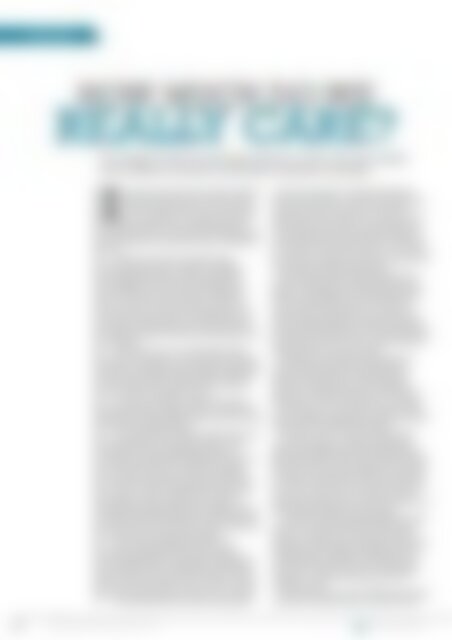December 2016 Credit Management magazine
THE CICM MAGAZINE FOR CONSUMER AND COMMERCIAL CREDIT PROFESSIONALS
THE CICM MAGAZINE FOR CONSUMER AND COMMERCIAL CREDIT PROFESSIONALS
Create successful ePaper yourself
Turn your PDF publications into a flip-book with our unique Google optimized e-Paper software.
EDUCATION<br />
HOW MUCH DO WE<br />
REALLY CARE?<br />
Sue Chapple FCICM, Executive Board Director of the CICM, was shocked<br />
at the treatment a friend received when he became vulnerable.<br />
I<br />
have spent the majority of my career working<br />
in and around debt, and up until six months<br />
ago I think I was firmly of the ‘can’t pay, won’t<br />
pay’ view of debtors. The majority of people<br />
in debt can afford to pay something. That was<br />
until someone in our social group suddenly found<br />
himself in what we now know to be a ‘vulnerable’<br />
state.<br />
A director of his own successful estate<br />
agency business with an office in an affluent<br />
area experienced the extremely distressing<br />
breakdown of his 20-year marriage and saw<br />
him suffer from acute anxiety and depression.<br />
Due to his illness he was unable to work and<br />
was forced to cut all personal expenditure and<br />
take the drastic decision to sell his business for<br />
nothing so that someone else could take on his<br />
business liabilities, which included paying his six<br />
employees.<br />
This meant that in one fell swoop he had no<br />
access to the internet or income. Even the form to<br />
apply for emergency income support is 93 pages<br />
long, and the Citizens Advice Bureau (CAB) had<br />
never experienced a situation where someone<br />
was not able to complete it online.<br />
As a group of friends, we have been keen to<br />
help and provide support while, on the advice of<br />
the doctor, trying to ensure that he is able to retain<br />
some kind of independence.<br />
The response from different organisations and<br />
the banks have had the worst impact. I cannot<br />
believe how his main High Street bank has<br />
responded. Despite fully explaining the position<br />
on day one (no income, no job and no ability<br />
to currently change any of that), and pleading<br />
with them to allow some breathing space, within<br />
a couple of weeks of defaulting on credit card<br />
payments, it was sending up to six letters a<br />
week demanding a phone call to explain. All this<br />
despite numerous lengthy letters explaining that<br />
the immediate level of anxiety meant a phone call<br />
of this nature was simply not possible.<br />
After having banked with them for 40<br />
years, I had expected there may be greater<br />
understanding. After eventually complaining, he<br />
was offered £120 as compensation, but advised<br />
that it had to be paid into his overdrawn account.<br />
This was the final straw, and as a result a number<br />
of us in the group have now moved our accounts.<br />
A few weeks ago he was close to being able<br />
to look for work again. I called the Job Centre<br />
three times (calls go to a national call office) and<br />
waited 40 minutes on each call. I was told no<br />
appointment was needed and he just had to turn<br />
up at the Job Centre, only to be confronted with<br />
a look of surprise from the receptionist when he<br />
arrived with her stating that she had no idea why<br />
we had been told that. No surprises - but the form<br />
we needed to complete was also online. This event<br />
again increased anxiety and distress.<br />
Seeing first-hand how quickly someone can<br />
become vulnerable has really opened my eyes.<br />
Anyone could experience emotional breakdown<br />
without warning. What is most shocking to me<br />
is how suddenly and quickly you can go from<br />
relative financial stability to trying to survive on<br />
£73 a week unemployment benefits; that’s barely<br />
enough to keep petrol in your car, especially when<br />
you consider his case and the number of doctors’<br />
appointments he has had to attend.<br />
My friend is in the largest demographic of<br />
those that find themselves in this situation. A<br />
single man with grown-up children that has<br />
recently, for the first time in his working life,<br />
become unemployed. Yet because of his lack of<br />
dependants – both his children are at university<br />
– he has been put to the back of the queue. Why<br />
are the systems and processes in place so stacked<br />
against those that need the most help?<br />
So what can we do to help? Certainly those<br />
in the debt industry can help by giving those<br />
experiencing difficulties some breathing space.<br />
By ensuring that the staff on the front-line actually<br />
deliver the services and empathy that we all hear<br />
is in place at strategic level. Given the right help<br />
he could have been back on his feet by now. This<br />
man is not a criminal out to defraud the system<br />
and take advantage of the state and society; he is a<br />
good man who has fallen on hard times.<br />
It was this experience that prompted me to get<br />
involved in the new CICM Vulnerability Group,<br />
which I am hopeful will go some way towards<br />
helping our staff to spot vulnerability and provide<br />
the right level of empathy to help those that are<br />
suffering. Statistics show that individuals, such<br />
as our friend, recover and return to being good<br />
customers – and they will remain loyal to the<br />
support provided.<br />
To find out more about the CICM’s Vulnerability<br />
Group visit the news section at www.cicm.com.<br />
20 <strong>December</strong> <strong>2016</strong> www.cicm.com<br />
The recognised standard


















